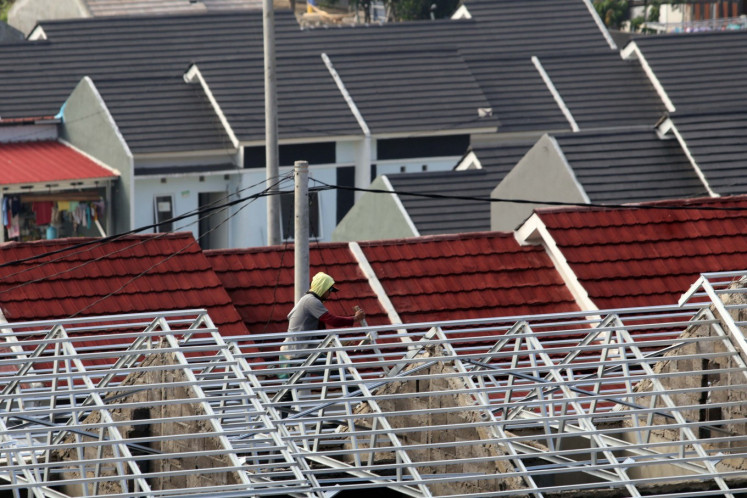Popular Reads
Top Results
Can't find what you're looking for?
View all search resultsPopular Reads
Top Results
Can't find what you're looking for?
View all search resultsIndonesia in fight with EU over biofuel, again
Indonesia is facing a fresh round of accusations over its management of its palm oil industry from one of its biggest importers, the European Union, adding to the prolonged feud between the two trading partners over the commodity
Change text size
Gift Premium Articles
to Anyone
I
ndonesia is facing a fresh round of accusations over its management of its palm oil industry from one of its biggest importers, the European Union, adding to the prolonged feud between the two trading partners over the commodity.
On July 23, the European Commission (EC) proposed imposing temporary duties ranging from 8 to 18 percent on imports of biodiesel produced by Indonesian companies. The companies include PT Ciliandra Perkasa, which faces an 8 percent import duty, PT Musim Mas, which faces a 16.3 percent duty, and PT Wilmar Bioenergi Indonesia, which faces an 18 percent duty. One type of biodiesel is made from palm oil.
The duties have been proposed through an EC provisional measure and follow allegations that palm oil companies in Indonesia receive various incentives and special subsidies from the government. These alleged incentives include subsidies from the Indonesian Oil Palm Estate Fund (BPDP-KS) and export financing from Indonesia Eximbank.
This latest blow to Indonesia’s palm oil industry comes just months after the EC decided that all palm oil products, including biofuel, should be phased out by 2030 because of concerns over deforestation.
In 2018, the EU was Indonesia's second largest palm oil export destinations behind India, importing 4.78 million tons of the commodity, according to Indonesian Oil Palm Association (GAPKI) data.
Pradnyawati, the Trade Ministry’s director for trade security, said the temporary duties were indicative of a clear protectionist tendency from the EU amid its continued attempts to limit imports of Indonesian palm oil.
“Yes, this is clearly structured, systematic and massive protectionism [by the EU]. They don't want their products to lose to ours, so we are being ambushed from all directions using all kinds of instruments,” Pradnyawati said at a press conference at the Trade Ministry on Friday.
“We’ve had the Renewable Energy Directive [RED] II applied, antidumping accusations and now subsidy accusations. [Indonesia’s palm oil industry] was even accused of breaching children rights and orangutan rights, all so that they would not be flooded with our products,” she said.
Before targeting Indonesia, the EU has also slapped Argentina’s soybean oil with import duties ranging from 25 to 33.4 percent.
The EC started its investigation into the government's alleged subsidies in May 2018 with its investigators coming to Indonesia to conduct interviews with officials from the Trade Ministry and other related institutions as well as representatives of the 10 largest palm oil companies in the country.
Despite these efforts, Pradnyawati claimed that the EC’s investigation was not conclusive, and hence it only imposed temporary duties. The duties will take effect on Sept. 6 and remain in place until the EC concludes its investigation in January 2020, when fixed duties are expected to be put in place.
After this date, the government and affected companies will be able to challenge the duties at the World Trade Organization and the European Court of Justice (ECJ), she added, pointing out that Indonesia had won five of its six disputes with the EU in the WTO’s Dispute Settlement Body.
In 2017, the government and Indonesian companies won antidumping disputes against the EU at the WTO and the ECJ, respectively.
The rulings forced the EU to lift its antidumping duties that had dragged down Indonesia’s biofuel exports to the region since 2013. Following the revocation, the value of Indonesia's palm oil exports jumped 356 percent to US$532.2 million in 2018 from only $116.74 million the year before.
“However, with these provisional duties, our exports to the EU will surely decrease this year,” Indonesia Biofuel Producers Association (Aprobi) chairman MP Tumanggor told The Jakarta Post over the phone on Friday.










